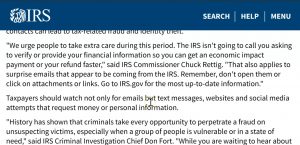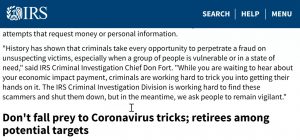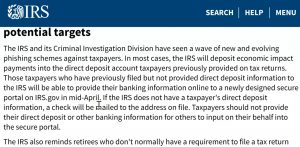IRS Internal Revenue Service news IRS issues warning about Corona virus related scams Watch out for scams tied to economic impact payments. The Internal Revenue Service today urged taxpayers to be on the lookout for a surge of calls and email phishing attempts about the corona virus or Cova 19. These contacts can lead to a tax related fraud and identity theft. Quote, we urge people to take extra care during this period the IRS isn’t going to call you asking to verify or provide your financial information so you can get an economic impact payment or your refund faster in quote.
00:38
So if you get a call or something saying hey, there’s we need to get some information related to this type of payment package, the IRS and it as a general rule, the IRS doesn’t typically call individual taxpayers that’s not typically the way it’s going to work. Typically you’ll get contact through actual mail. So be on the lookout for that there will typically or there will Be phishing attempts most likely here. So that was said by the IRS commissioner Chuck Reddick. Another quote, that also applies to surprise emails that appear to be coming from the IRS.

01:14
Remember, don’t open them or click on attachments or links go to the irs.gov for the most up to date information. So also with the email, obviously, the phishing attempts could happen with the emails as well. And you don’t even want to open the emails because they could have something in them some kind of virus or whatever in the actual email that could infect the computer. So you want to go directly if you get some information from the IRS. Then what you do is you basically if you have any question about it, typically you want to just drop that information don’t return to that particular information go but go directly to the source and then ask them about it.
01:48
So then you contact IRS dot govt go through that type of contact information. And then you can be sure there and check in on it and double check and see if it’s a valid activity or not, but you want to make sure that you go to the source and that’s going to be the IRS govt back to the text. Taxpayers should watch not only for emails but text messages, websites and social media attempts that request money or personal information.

02:14
Quote, history has shown that criminals take every opportunity to perpetuate a fraud on unsuspecting victims, especially when a group of people is vulnerable or in a state of need in quote, said IRS commissioner investigation, Chief Don forte, quote, while we are waiting to hear about your economic impact payment, criminals are working hard to trick you into getting their hands on it. The IRS Criminal Investigation Division is working hard to find these scammers and shut them down. But in the meantime, we ask people to remain vigilant and quote, so we have some kind of stimulus package stimulus, stimulus money going around at this point in time.
02:56 Link to this point in the video
Obviously people that are that might want to have theft going on. see an opportunity with this kind of stimulant pay payments for some type of theft, which also often involves some type of identity theft involved within it. So back to the text don’t fall prey to Corona virus tricks retirees are among potential targets. The IRS has its criminal investigation divisions have seen a wave of new and evolving phishing schemes against taxpayers. In most cases, the IRS will deposit economic impact payments into the Direct Deposit Account taxpayers previously provided on tax returns. Those taxpayers who has previously filed but not provided direct deposit information to the IRS will be able to provide their banking information online to a newly designed secure portal on irs.gov in mid April.

03:47
So in other words, the IRS is really trying to get the direct deposit into the bank accounts for multiple reasons. It can be more secure if you have that direct deposit information but also they can they’re able to do the stimulus package much faster and get the money Out easier so they’re trying to make sure they get a very secure system to have that direct payment and get that get that stimulus money out it back to the text. If the IRS does not have a taxpayers direct deposit information, it check will be mailed to the address on file taxpayer should not provide the direct deposit or other banking information for others to input on their behalf into the secure portal.
04:26
So basically, you want to enter that information into into the portal and not have an agent. Do that or someone else do that. The IRS also reminds retirees who don’t normally have a requirement to file a tax return that no action on their part is needed to receive their $1,200 economic impact payment payment. Seniors should be especially careful during this period. The IRS reminds retirees including recipients of form SS a 1099 and Rb 1099. That no one from the agency will be Reaching out to them by phone, email, mail, or in person asking for any kind of information to complete their economic impact payment. Also, sometimes referred to as rebates or stimulus payments.
05:13
So if you get that kind of that’s going to be a phishing type of email, it’s often email and it’s often going to be phone looking for information. And again, if you get it you got any questions about it, go to the source, go to the irs.gov website and see if you can contact the IRS directly from there to check in on it. So the IRS is sending these 1200 payments automatically to retirees, no additional action or information is needed on their part to receive this. The IRS reminds taxpayers that scammers may emphasize the word stimulus check or stimulus payments.
05:48
So they’re gonna say hey, you know, this is related to your stimulus check, obviously, trying to try to get fishing for information. The official term is economic impact payment, so ask that Ask the taxpayer to sign over their economic impact payment check to them ask by phone, email, text or social media for verification of personal and or banking information saying that the information is needed to receive or speed up their economic impact payment, or suggest that they can get a tax refund or economic impact payment faster by working on the taxpayers behalf. This scam could be conducted by social media or even in person, mail the taxpayer a bogus check, perhaps in an odd amount, then tell the taxpayer to call a number or verify information online in order to cache it. So reporting Corona virus related or other phishing attempts, so the reporting here, those who receive unsolicited emails, text messages or social media attempts to gather information that appear to be from either the IRS or organization closely linked to the IRS, such as the electronic federal tax payment system.
07:00
The eftps should forward it to and there’s going to be a link here but it’s phishing@irs.gov pH I sh i n g at IRS dot govt and then taxpayers are encouraged not to engage potential scammers online or on the phone. Learn more about reporting suspected scams by going to the report fishing and online scams page on irs.gov. There’s a link to that here. You can also find it on IRS dot govt official IRS information about the cobit 19 pandemic and economic impact payments can be found on the current Corona virus tax relief page@irs.gov. So again, if you want information on any kind of relief related to the corona virus, or the Cova 19 you can go to irs.gov and you should find it fairly appropriate you know, in the first part of the page there for it so The page is updated quickly and when new information is available